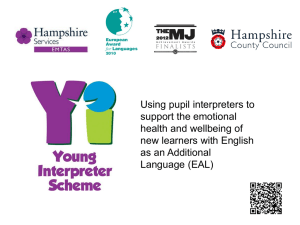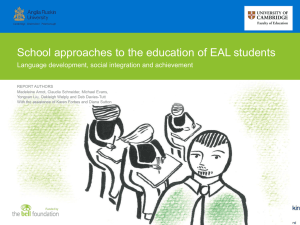all_children_achieving_well - Hertfordshire Grid for Learning
advertisement
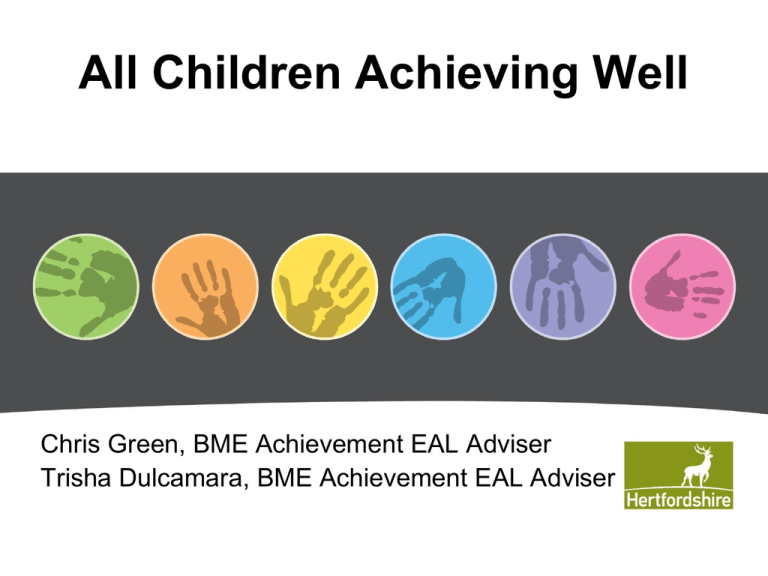
All Children Achieving Well Chris Green, BME Achievement EAL Adviser Trisha Dulcamara, BME Achievement EAL Adviser Welcome Sveicināti Latvian Structure from 1 September 2011 BME ACHIEVEMENT st Lead Adviser BME Achievement Carole Connelly BME Achievement Advisers Lesley Buck Francine Coates Learning Mentors Samantha Brown Yvonne Gordon Fay Lindo Marlene Smith-Taylor Achievement and Family Learning Refugee Support Wahida Pervaiz EAL Advisers Patricia Dulcamara Christina Green Traveller Adviser Kathryn Stockdale Family Learning Support Workers Suraya Alam Shamima Chowdhury Tasmia Chowdry Shahida Usman Traveller Support Workers Ruth Boswell Vicky Brinkley Gordana Wilhelm School Equalities Adviser Angela Walford Senior Support Officer Jane Robson Support Officers Daksha Bakrania Susan Neville Community & Schools Partnership Adviser Nusrat Khan Complementary & Supplementary Co-ordinator Noah Kaindama Hertfordshire What do we know from the data? Where are the gaps? What proportion of pupils in maintained primary schools in Hertfordshire were reported as EAL at end of KS2 in 2010? 7.6% 9.4% 6.5% 10.9% Where are the gaps? What proportion of pupils in maintained primary schools in Hertfordshire were reported as EAL at end of KS2 in 2010? 7.6% 9.4% 6.5% 10.9% Where are the gaps? What proportion of pupils in maintained primary schools in Hertfordshire were eligible for FSM at the end of KS2 in 2010? 27% 16% 11% 31% Where are the gaps? What proportion of pupils in maintained primary schools in Hertfordshire were eligible for FSM at the end of KS2 in 2010? 27% 16% 11% 31% Narrowing the Gap: from data analysis to impact The Golden Thread DfES 09-2009 Ref: 00792-2009PDF-EN-01 Do you know who your bilingual pupils are? Beginner bilinguals are easy to identify Advanced bilinguals are harder to identify Those that are most difficult to identify often have poor language skills in their first language and English. Do you know children in your schools that fit this profile? It is important to have the correct background information on the admissions application. Is there a place for first language assessments? How useful are they? Jim Cummins BICS Basic Interpersonal Communicative Skill CALP Cognitive and Academic Language Proficiency (Cummins) We can support schools with: Developing admission forms that will provide more detailed information New arrival strategies that will enable you to support any child, speaking any language Classroom strategies for teachers and TAs that benefit all pupils It is essential in our increasingly diverse schools to: Identify EAL learners Track development Carefully plan for language acquisition Provision for the development of language needs to be a whole school approach. If led from the top it becomes:- routine simple embedded The task shapes the language Identify a function and plan a scaffold Even with the best L.O. the teacher needs to understand the language structure required to complete the function. Function Structure Literature Describing Evaluating Expressing feelings There is /there are The scenery in the background is rugged and inspiring. Function Structure Geography Naming Locating Cause and effect The mountain..the slope…the valley has/is In front of…next to Caused by…..occurs when Identifying the structures benefits every child Plans can simply be annotated with the structure/s to be the focus for teaching Literacy Year 1 Topic/Subject Area: Tales from other Cultures – ‘Give Me My Yam’ Language Function : recounting (past tense) expressing an opinion Learning Intentions Activities Language/Key questions Vocabulary Retell stories giving the main points in sequence Give reasons for events in stories Make predictions about the story’s development (S +L) Use phonic knowledge to write independently Group – sequence the main elements of the story (first half) using sequencing cards. Pick out key words – Eg Jordan, yam, lost etc) Activity – to draw a picture of the start of the story labelling main elements and adding a sentence using the past tense Past tense eg. the boy dug up a yam Expressing an opinion – I think that... What do you think a yam is? What might it be like? What do you think will happen next? yam, Caribbean, culture, traditional story sequence, main events Review Make predictions about how the story may end. Discuss with LP. Success Criteria Key Visuals Evaluation of success criteria 1.Remember main events in sequence. 2.Make predictions about what will happen next. 3.Use phonic knowledge to write key words independently Picture sequencing cards Artefacts from story sack White board Yam (if possible) 1. We can support you with: Admissions CPD for teachers and TAs Training for governors Tracking and assessment Parent/ pupil liaison First language assessment Developing the role of EAL co-ordinators More details are soon to be available on the new Improving Schools’ Directory Contact details: Sue Neville Tel: 01438 844890 susan.neville@hertscc.gov.uk Chris Green chris.green@hertscc.gov.uk Trisha Dulcamara patricia.dulcamara@hertscc.gov.uk Thank you


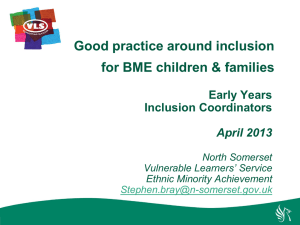


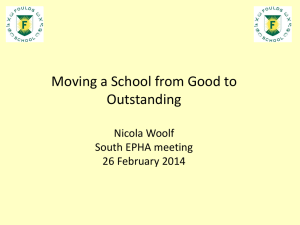
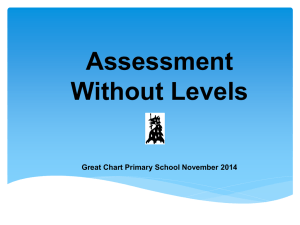
![afl_mat[1]](http://s2.studylib.net/store/data/005387843_1-8371eaaba182de7da429cb4369cd28fc-300x300.png)

